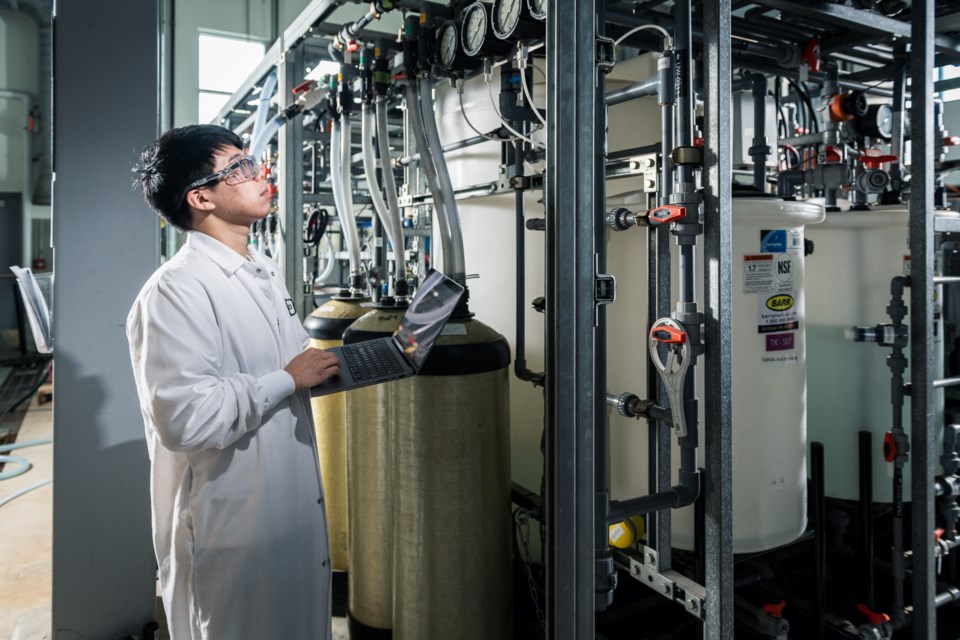In 2023, global demand for lithium-ion batteries was forecasted to grow sixfold—from 0.7 terawatt hours to 4.7 terawatt hours—by 2030, driven largely by demand from electric vehicles.
For North America, Japan and Europe, one of the challenges in EV and battery manufacturing will be producing enough battery grade lithium to meet the demand in EV growth, especially now that China has made moves to restrict the export of lithium refining technology.
All of which makes the recent announcement of a new $50 million (US$35 million) lithium refinery in B.C. well-timed.
Mangrove Lithium, a B.C. cleantech originally backed by Bill Gates’ Breakthrough Energy Ventures, recently announced the closing of a $50 million financing deal to finance the construction of a new lithium refinery in Delta, B.C.
The recent $50 million raise comes from a consortium of investors that includes Japan’s Mitsubishi Corp. and Asahi Kasei Corp., New York venture capital firm Orion Industrial Ventures, Export Development Canada and InBC Investment Corp.
The new plant will take raw lithium from various North American sources and refine it into battery grade lithium hydroxide used in batteries. The plant will produce enough battery-grade lithium to supply up to 25,000 electric vehicles a year—about 10 per cent of Canada’s EV market.
“The goal of this plant is to prove the technology to a commercial scale,” said Mangrove Lithium CEO and co-founder Saad Dara, who has a PhD in chemical and biological engineering. “In parallel, we’ve already started work on much bigger plants that we will look to deploy elsewhere.”
Mangrove Lithium was spun out of the University of British Columbia in 2017, with initial backing from Gates’ Breakthrough Energy Ventures, BMW i Ventures and BDC Capital. It started as a water-tech company focused on desalination and water treatment, but later pivoted to lithium refining.
“Soon we realized that, actually, the market fit for the technology was much stronger elsewhere,” Dara said. “We saw there was a strong need for the technology in lithium.”
Conventional lithium processing uses chemicals, which can be costly and generate some waste. The Mangrove process that Dara and four of his co-founders developed uses electricity, which reduces both waste and costs and eliminates impurities.
Mangrove currently employs 50 people at its head office in Mount Pleasant and pilot plant on Annacis Island. The new refinery, to be built on Tilbury Island, will employ 30 to 40 people, and the company plans to consolidate all of its operations at that new location.
Developing more refining and smelting capacity is an import part of the critical minerals value chain that Canada is trying to develop to become more self-reliant in EV manufacturing.
“Canada does have an opportunity here because China really controls so much of the refining in the world of metals and minerals, and because there’s an increased interest right now for all countries to be able to secure their own supply chains,” said Merran Smith, president of New Economy Canada. “We’ve got the metals and minerals, and that’s an opportunity for us to look into the refining.”
She noted that, in 2024, global investments in cleantech reached $2 trillion, according to Bloomberg New Energy Finance.
“This is the direction the world is going—shifting to clean electricity and clean technologies to take advantage of that to power vehicles, to power industry” Smith said. “It’s going to be a long transition, but the pace of investment is over $2 trillion last year was invested globally, and Canada cracked the top 10. We were the eighth location for investment with over $35 billion.”
Just last month, China’s Ministry of Commerce announced plans to ban the export of Chinese lithium refining and gallium extraction technology, making Mangrove’s new lithium refining process all that more timely.
“Many of these technologies, operations and processes aren’t just about the technology—they’re actually about the know-how,” Dara said. “Without that know-how … it is very difficult to actually develop that industrial base of manufacturing capacity. They have a massive lead on critical minerals and refining—so lithium, nickel, cobalt, copper, different things—and what they’re trying to do is prevent the rest of the world from catching up.”
Dara said most of the lithium the new plant will produce will be going to markets in Europe and Japan. He said the company hopes to expand and build other lithium refineries elsewhere, with potential markets being in Eastern Canada, the U.S., South America, Australia and Europe.
He added that construction of the new Tilbury Island refinery can be expected to start soon.
“We’re deep into wrapping up procurement and deep into construction and execution soon,” he said.
The company is aiming to be in commercial production in the fourth quarter of this year.




